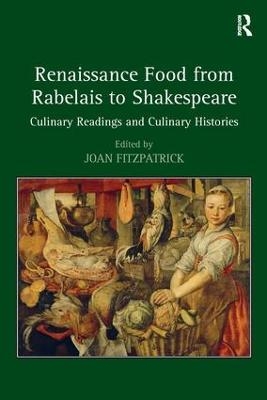
Renaissance Food from Rabelais to Shakespeare
Routledge (Verlag)
978-0-7546-6427-7 (ISBN)
Providing a unique perspective on a fascinating aspect of early modern culture, this volume focuses on the role of food and diet as represented in the works of a range of European authors, including Shakespeare, from the late medieval period to the mid seventeenth century. The volume is divided into several sections, the first of which is "Eating in Early Modern Europe"; contributors consider cultural formations and cultural contexts for early modern attitudes to food and diet, moving from the more general consideration of European and English manners to the particular consideration of historical attitudes toward specific foodstuffs. The second section is "Early Modern Cookbooks and Recipes," which takes readers into the kitchen and considers the development of the cultural artifact we now recognize as the cookbook, how early modern recipes might "work" today, and whether cookery books specifically aimed at women might have shaped domestic creativity. Part Three, "Food and Feeding in Early Modern Literature" offers analysis of the engagement with food and feeding in key literary European and English texts from the early sixteenth to the early seventeenth century: François Rabelais's Quart livre, Shakespeare's plays, and seventeenth-century dramatic prologues. The essays included in this collection are international and interdisciplinary in their approach; they incorporate the perspectives of historians, cultural commentators, and literary critics who are leaders in the field of food and diet in early modern culture.
Joan Fitzpatrick (Lecturer, Loughborough University) is author of Food in Shakespeare (Ashgate, 2007) and a forthcoming Athlone dictionary entitled Shakespeare and the Language of Food.
Introduction, Joan Fitzpatrick; Part 1 Eating in Early Modern Europe; Chapter 1 Crammed with Distressful Bread? Bakers and the Poor in Early Modern England, Diane Purkiss; Chapter 2 Fishes, Fowl, and La Fleur de toute cuysine : Gaster and Gastronomy in Rabelais’s Quart livre, Timothy J. Tomasik; Part 2 Early Modern Cookbooks and Recipes; Chapter 3 Recipes for Knowledge: Maker’s Knowledge Traditions, Paracelsian Recipes, and the Invention of the Cookbook, 1600–1660, Elizabeth Spiller; Chapter 4 Cooking as Research Methodology: Experiments in Renaissance Cuisine, Ken Albala; Chapter 5 Distillation: Transformations in and out of the Kitchen, Wendy Wall; Part 3 Food and Feeding in Early Modern Literature; Chapter 6 Performances of the Banquet Course in Early Modern Drama, Tracy Thong; Chapter 7 ‘I Must Eat my Dinner’: Shakespeare’s Foods fromApples to Walrus, Joan Fitzpatrick; Chapter 8 Narrative and Dramatic Sauces: Reflections upon Creativity, Cookery, and Culinary Metaphor in Some Early seventeenth-Century Dramatic Prologues, Chris Meads;
| Erscheint lt. Verlag | 17.3.2010 |
|---|---|
| Verlagsort | London |
| Sprache | englisch |
| Maße | 156 x 234 mm |
| Gewicht | 476 g |
| Themenwelt | Geisteswissenschaften ► Geschichte ► Allgemeine Geschichte |
| Geschichte ► Teilgebiete der Geschichte ► Kulturgeschichte | |
| Geisteswissenschaften ► Sprach- / Literaturwissenschaft ► Anglistik / Amerikanistik | |
| Geisteswissenschaften ► Sprach- / Literaturwissenschaft ► Literaturwissenschaft | |
| Studium ► 1. Studienabschnitt (Vorklinik) ► Med. Psychologie / Soziologie | |
| Studium ► Querschnittsbereiche ► Geschichte / Ethik der Medizin | |
| Sozialwissenschaften ► Soziologie | |
| ISBN-10 | 0-7546-6427-9 / 0754664279 |
| ISBN-13 | 978-0-7546-6427-7 / 9780754664277 |
| Zustand | Neuware |
| Haben Sie eine Frage zum Produkt? |
aus dem Bereich


